Matter and Materials | Term 1 Chapter 2 | 4th Science - Questions with Answers | 4th Science : Term 1 Unit 2 : Matter and Materials
Chapter: 4th Science : Term 1 Unit 2 : Matter and Materials
Questions with Answers
Matter and Materials ( Term 1 Chapter 2 | 4th Science )
Evaluation
I Find the odd one.
1. brick, coir, silk cloth, pine
apple
Answer: silk cloth
2. stone, rubber band, cycle
tube, electric wire
Answer: stone
3. sun, candle, torch, pen
Answer: pen
4. umbrella, sponge, rain coat,
jerkin
Answer: sponge
5. glass bottle, exam pad, paper
plate, wooden board
Answer: glass
bottle
II Fill in the
blanks.
1. Materials which can be
compressed or cut easily are called soft materials.
2. Gold and diamond are the
examples of shiny materials.
3. Materials which can be bent or
stretched easily are called flexible materials.
4. Transparent objects allow all the light to
pass through them.
5. Light is the natural source that stimulates sight and makes things visible.
III Match the
following.
1. Light source - Glass
2. Waterproof - Vegetable oil
3. Transparent - Sun
4. Translucent - Metal
5. Opaque - Rain coat
Answer:
1. Light source - Sun
2. Waterproof - Rain coat
3. Transparent - Glass
4. Translucent - Vegetable oil
5. Opaque - Metal
IV Say True or
False.
1. We cannot compress, cut or
bend the rough materials easily. (True)
2. Dull materials reflect light. (False)
3. Sand paper is a good example
for smooth materials. (False)
4. Opaque objects do not allow
light to pass through them. (True)
5. Mirrors change the direction
of light that fall on them. (True)
V Answer the following.
1. When can you say a material is
waterproof material?
Materials that do not allow water to pass through
them are called Waterproof Materials.
Example : Raincoat and aluminium foil of tablet
strip.
2. What is a light source?
The objects that give off light are called light
sources.
3. What is the difference between
transparent and opaque materials?
Transparent objects allow the light to pass through
them. Opaque objects do not allow light to pass through them.
4. Define reflection.
The bouncing of light by any smooth or polished
surface is called reflection.
5. Classify the objects given
below as transparent, translucent or opaque materials.
(Air, Rock, Water, Aluminium foil, Mirror, Snow, Wooden board, Polythene bag, CD, Oil soaked paper, Glass tumbler and Coloured glass)
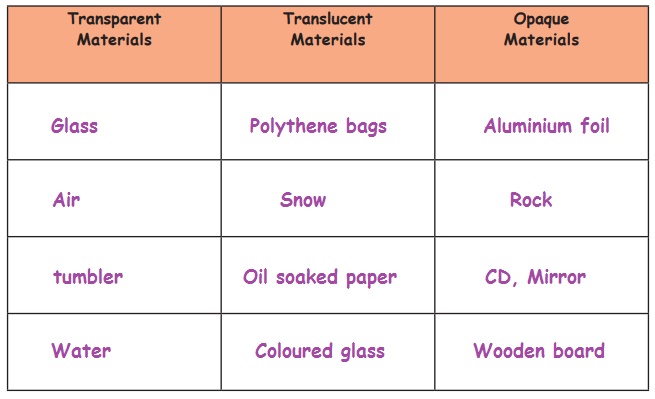
Transparent Materials : Air, Glass
tumbler, Water
Translucent Materials : Snow, Polythene
bags, Oil soaked paper, Coloured glass
Opaque Materials : Rock, Aluminium
foil, CD, Wooden board, Mirror
VI Projects
Collect some rough and smooth
materials from your surrounding.
Try to Answer
Look at the pictures and identify the materials by which they are made of:
(paper, clay, glass, wood, plastic, metal rubber, wax)
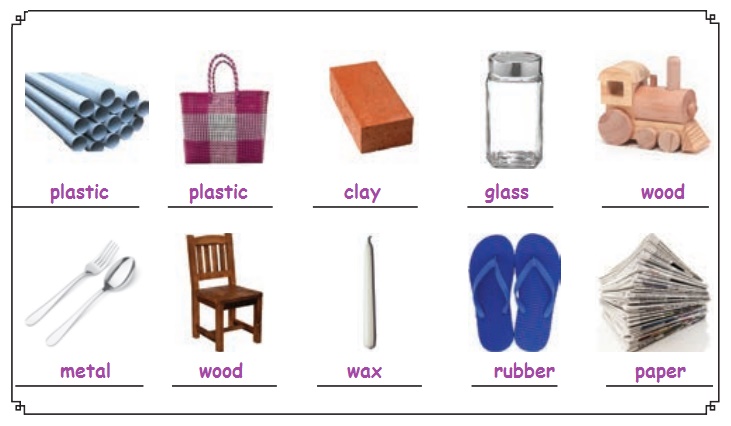
Try to Answer
Match the objects that are made of same material.
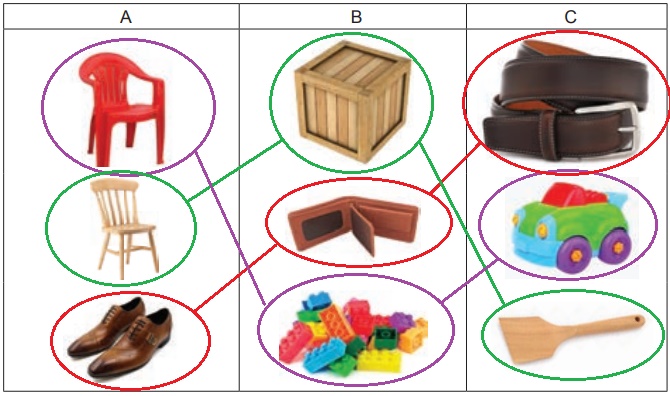
Answer: Plastic material, Wooden material, Leather material
Try to Answer
Write whether the given materials are hard or soft.

Try to Answer
Collect some objects from your house and classify them as shiny or dull materials.
Try to Answer
Sort the given objects as rough or smooth.

Activity
Test the flexibility.
Give one plastic scale and wooden scale to the students. Ask them to bend. Tabulate their observation (bends, does not bend).

Think and answer
Do you have a raincoat? What is its use?
Activity
Take a glass bowl. Fill three fourth of it with water. Put an orange fruit with peel and an orange fruit without peel. Observe which orange floats? Why?
Answer: Orange with peel floats because it is waterproof. Orange without peel sinks because water gets into it and makes it heavy.
Activity
Complete the Worksheet
Name : Class :
Date : Unit : 2. Matter and Materials
Complete the sentence in you own words.
1. Transparent objects allow light to pass through them.
2. Translucent objects allow some light to pass through them.
3. Opaque objects allow no light to pass through them.
Try to Answer
Write whether the objects are transparent, translucent or opaque.
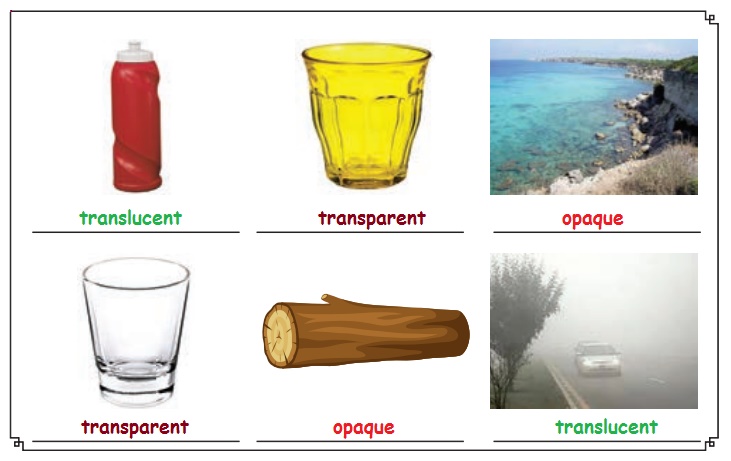
Try to Answer
Try to see your face on some materials like mirror, exam pad, new stainless steel plate, table top and water in a plate. What are the materials that show your face clearly? Do you know why?
Answer: Mirror and new stainless steel plate show my face clearly. This is because their polished surface reflects light.
Activity
Reflection of Light
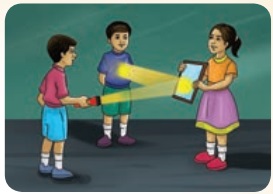
Material Required/Needed
A plane mirror and a torch light
How to do?
1. Make your room dark by closing the door and windows.
2. Ask your friend to hold a mirror in his/her hand at one corner of the room.
3. Stand at another corner with a torch in your hand.
4. Switch it on.
5. Direct the light from the torch onto the mirror.
6. Answer the following from your observation:
a) When you change the angle of the mirror, what happens to the light?
Answer: The angle of reflection also changes when we change the angle of the mirror.
b) Are you able to direct the reflected light using the mirror?
Answer: Yes, I am able to direct the reflected light using the mirror.
Related Topics